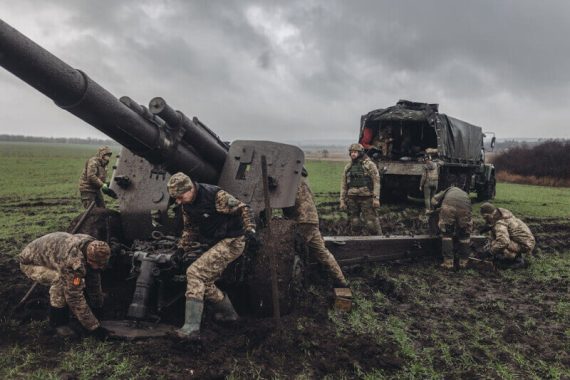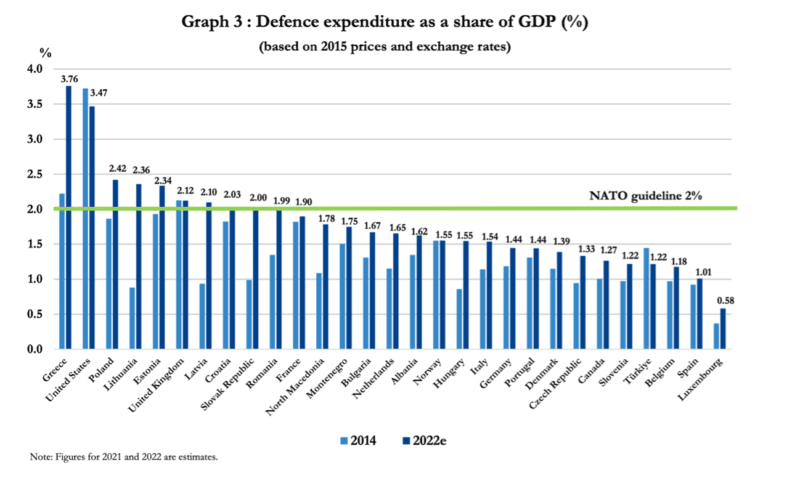A
s the war in Ukraine enters its tenth month, multiple NATO and European countries have announced a momentous increase in military spending. Since the Russia-Ukraine war escalated, 29 European states have pledged more than $209 billion in new defense funding—a trend that is expected to climb in 2023.
NATO Secretary General Jens Stoltenberg stated in an interview on December 16 that NATO member states must increase their arms production to replenish depleted stocks going to Kyiv.
NATO member countries are reportedly set to increase their defense budgets in 2023 after the council meeting on Wednesday, December 14, with the alliance aiming to spend a total of 2% of their respective GDPs on defense. The civil budget is set at €370.8 million, a 27.8% increase from 2022, while the military budget is set at €1.96 billion, a 25.8% increase from the previous year. The alliance increased preemptive measures after Russia’s challenges and concerns over member states’ security in Eastern Europe.
“We have to understand that President Putin is ready to be in this war for a long time and to launch new offensives,” Stoltenberg continued with a notable emphasis on maintaining a strong and united alliance in the face of challenges from Russia and other external threats.
The Stockholm International Peace Research Institute (SIPRI) stated that the war in Ukraine had boosted demand for weaponry in 2022; however, the conflict may also lead to a supply shortage, as Russia is the leading supplier of raw materials in arms production.
Ukraine’s requests for more weapons and a huge flow of ammunition have depleted the supplies of NATO member states and sparked fears that the alliance’s defense industries may be unable to produce enough.
Increased remilitarization is making a comeback in Europe due to security concerns following Russia’s invasion of Ukraine and the proliferation of armaments, despite global disarmament initiatives.
SIPRI estimates that the war is going to accelerate an upward trend in global military spending as it reaches an all-time high in 2022.
NATO allies follow U.S. lead in boosting defense budgets
The United States, which is the largest contributor to NATO’s defense budget, is expected to lead the way in terms of increased spending. U.S. President Joe Biden has proposed a defense budget of $858 billion for 2023, a significant increase from previous years. As part of defense spending for the alliance, the U.S. pledged to allocate $6.9 billion to counter Russian aggression.
Germany’s 180° turnaround on defense spending
Nations that had low levels of defense spending in recent history, such as France and Germany, are stepping up, while countries that import most of their weapons from Russia are doubting their reliability and future delivery. Germany failed to meet NATO’s defense goal of 2% in 2021. In the aftermath of the Russian invasion of Ukraine, German Chancellor Olaf Scholz announced a €100 billion fund to upgrade the country’s defense capabilities by increasing spending from 1.53% of the GDP to above 2%.
Recommended
Scholz stated, “We need to invest significantly more in the security of our country to protect our freedom and our democracy.” If Germany’s requested funds are approved, it will be a significant step for the country as it becomes the largest defense spender in Europe.
According to data derived from NATO, only nine members, namely Greece (3.76%), the United States (3.47%), Poland (2.42%), Lithuania (2.36%), Estonia (2.34%), the United Kingdom (2.12%), Latvia (2.10%), Croatia (2.03%), and the Slovak Republic (2.00%) met the recommended defense spending target of 2% of GDP in 2022.
New era of defense spending
Following Germany’s path, Belgium announced an increase in its defense budget from the current €4.2 billion (0.9% of its GDP) to €6.9 billion (1.54% of its GDP) by 2035. Prime Minister Alexander De Croo told parliamentarians that this was not enough, signaling more steps may come.
During the parliamentary group meeting held on October 19, Turkish President Recep Tayyip Erdoğan announced plans to increase the country’s defense budget by 100 billion Turkish liras (approximately €26 billion) for 2023. “As a result of increased threats in the world and in our neighborhood, we are increasing our defense budget for 2023 to a high enough level, 469 billion liras,” he continued.
Romania announced on March 1 that the country will increase its defense budget from 2.02% to 2.5% of its GDP starting in 2023. The country’s 2022 defense budget of RON 25.9 bn ($5.8 bn) is already 14% higher than the previous year.
Poland’s Deputy Prime Minister Jaroslaw Kaczynski has stated that the country is aiming to increase its defense spending from 2.1% to 3% of its GDP by 2023. This decision comes as Poland shares a border with Ukraine and aims to strengthen its domestic security.
Italy, currently spending 1.41% of its GDP on defense (about €24.4 billion or $29.8 billion), has also announced plans to increase defense spending to 2% of its total GDP by 2028. The Italian parliament welcomed decision to “guarantee the country’s deterrence and capacity to protect national interests.” To meet the 2% goal, Italy’s defense budget would need to increase from $29.8 billion to $41 billion.
The latest NATO member taking a step to increase defense spending is Norway, which announced on March 18 that the country aims to provide an additional NOK 3 billion ($341 million) to shore up its military forces along its 120 miles of land and 1,087.49 miles of maritime border with Russia. Former Norwegian defense minister Odd Roger Enoksen stated that the country must increase its presence in the north, as Russia has significant security interests in the region.






